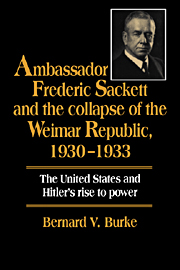Book contents
- Frontmatter
- Contents
- Acknowledgments
- Abbreviations used in the notes
- Introduction
- 1 A time of opportunity
- 2 American diplomacy, official and unofficial
- 3 The landslide election
- 4 Sackett takes the initiative
- 5 Sackett and the financial crisis
- 6 Perceptions of Nazism and communism, with an afterthought on fascism
- 7 One end, two paths: Brüning and Hitler in conflict
- 8 Efforts to sustain representative government in Germany
- 9 Sackett loses heart with Brüning's fall
- 10 The decline of Hitler and the Nazis
- 11 Through a glass darkly
- Conclusion
- Bibliography
- Index
1 - A time of opportunity
Published online by Cambridge University Press: 30 September 2009
- Frontmatter
- Contents
- Acknowledgments
- Abbreviations used in the notes
- Introduction
- 1 A time of opportunity
- 2 American diplomacy, official and unofficial
- 3 The landslide election
- 4 Sackett takes the initiative
- 5 Sackett and the financial crisis
- 6 Perceptions of Nazism and communism, with an afterthought on fascism
- 7 One end, two paths: Brüning and Hitler in conflict
- 8 Efforts to sustain representative government in Germany
- 9 Sackett loses heart with Brüning's fall
- 10 The decline of Hitler and the Nazis
- 11 Through a glass darkly
- Conclusion
- Bibliography
- Index
Summary
On a pleasant Saturday afternoon in early December 1931, two American diplomats and their wives were enjoying an afternoon in the suburban Berlin home of a prominent German banker. They had just settled in and were exchanging pleasantries over tea when four men were ushered into the room. They were introduced as Ernst Hanfstaengl, Rudolf Hess, Captain Göring, and a Herr “Wolff” – whom the Americans quickly recognized as Adolf Hitler. The clandestine encounter was arranged by the German banker with the consent of Frederic Sackett, the American ambassador to Germany, as an exceptional opportunity for the ambassador to meet with the Nazi leader. Although he had been in Berlin for nearly two years, Sackett was encountering Hitler personally for the first time and in fact was the first American diplomat to meet him. Sackett was not fluent in the German language, so the first secretary of the embassy, Alfred Klieforth, accompanied him. It was a daring meeting; in those days consorting with the opposition to the government was considered bad form. American diplomacy had not yet been wedded to intelligence operations, and anything resembling covert activity or other underhanded methods was beyond its capability or understanding.
The two Americans, the German banker, and their wives sat with the three Nazis and listened to Hitler launch into a long harangue as if he were addressing a large audience. Sackett was not persuaded by the rhetoric, but he had a firsthand opportunity to evaluate the Nazi leader. Hitler impressed him as a “fanatical crusader” whose “forcefulness and intensity” enabled him to establish leadership “among those classes that do not weigh his outpourings.”
- Type
- Chapter
- Information
- Publisher: Cambridge University PressPrint publication year: 1995



